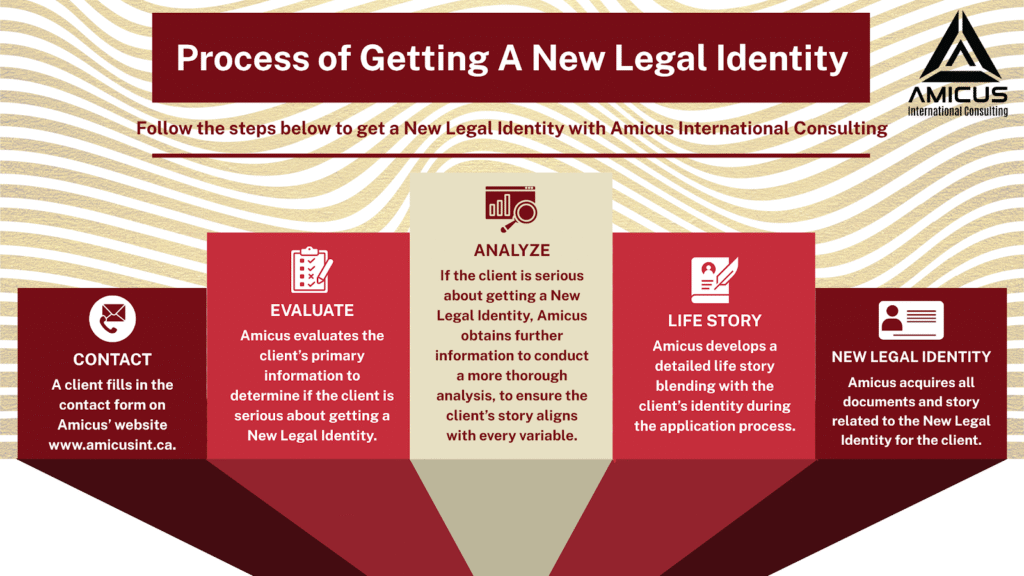**VANCOUVER, British Columbia —**In a world where data breaches, biometric surveillance, and government overreach threaten personal privacy, a growing number of individuals are turning to offshore identity structures to protect themselves. Contrary to popular misconceptions, international law provides specific protections that make offshore identities not only legal but also safeguarded under a range of conventions, treaties, and judicial norms.
Offshore identities—when obtained through lawful means such as legal name changes, citizenship-by-investment programs, and residency permits—are recognized and respected under international frameworks. The right to privacy, the freedom of movement, and the sovereignty of nations to grant nationality serve as pillars supporting the legal use of offshore identities.
This press release explores the international legal protections surrounding offshore identities and highlights how individuals can use these mechanisms to build secure, legitimate lives across borders—without violating the law.
Offshore Identities: What They Are and How They Work
Offshore identities refer to the legal acquisition of a new identity, typically involving citizenship, residency, or legal name changes in jurisdictions outside one’s birth country. These identities are created through lawful means and can include:
- Citizenship by Investment or Naturalization in a second country
- Legal name changes supported by court orders or civil procedures
- Establishment of offshore entities (e.g., trusts, corporations) under new identities
- Issuance of legal government documents such as passports or national ID cards
The key distinction is legality. Individuals seeking these tools through Amicus International Consulting are not attempting to defraud, evade taxes illegally, or escape justice—but to establish new lives where their rights, safety, or privacy can be better protected.
International Law’s Foundation: State Sovereignty Over Citizenship
The most fundamental legal principle protecting offshore identity is the sovereignty of states over their nationality laws. According to the Hague Convention of 1930 on Certain Questions Relating to the Conflict of Nationality Laws:
“It is for each State to determine under its law who are its nationals.”
This means that if a country grants a person citizenship or a legal name change, no other country has the right to interfere—provided there is no fraud or criminal deception. This principle is the bedrock of second citizenship programs globally, including those in the Caribbean, Eastern Europe, and the South Pacific.
Case Study: Second Citizenship Through the Caribbean
A U.S.-born entrepreneur facing cyber harassment and reputational damage used a Dominica citizenship-by-investment program to obtain a second passport. His application was vetted, taxes were paid, and all paperwork was processed transparently. Under international law, this citizenship—and the identity accompanying it—is valid and protected, despite being separate from his U.S. origin.
Today, he lives under this identity, with full legal rights in his new jurisdiction, using offshore banking and business services with complete transparency.
Legal Identity vs. Fraudulent Identity: A Key Distinction
International law does not protect fraud—but it does defend legal identity changes. Article 12 of the Universal Declaration of Human Rights states:
“No one shall be subjected to arbitrary interference with his privacy, family, home or correspondence, nor to attacks upon his honor and reputation.”
This clause—reinforced by similar provisions in the International Covenant on Civil and Political Rights (ICCPR)—has been used in multiple international legal cases to protect individuals who sought new identities due to safety concerns, including whistleblowers, political dissidents, and journalists.
The European Court of Human Rights (ECHR) has repeatedly ruled that an individual’s right to establish identity—particularly through legal name or gender changes—falls within the right to private life (Article 8, ECHR). This interpretation extends to offshore identity creation when done lawfully.
Case Study: Gender Transition and Offshore Identity
A Canadian national seeking gender transition faced hostility and legal delays at home. Through Amicus International Consulting, she acquired legal gender reassignment documentation in Argentina—recognized under that country’s Gender Identity Law. With her new passport and identity, she now lives safely in Portugal under complete legal protection. Both Argentina and Portugal are parties to international conventions affirming mutual respect of civil documentation, making her new offshore identity fully valid.

Mutual Recognition of Documents: Legal Weight Across Borders
Treaties like the Vienna Convention on Consular Relations (1963) and bilateral agreements between countries stipulate that passports, ID cards, and other civil documents issued by one country are to be respected by another—unless forged or improperly obtained.
As long as the issuing nation confirms the document’s authenticity, an individual’s offshore identity holds legal validity internationally. This protects individuals from arbitrary denial of services, travel restrictions, or diplomatic issues—mainly when offshore identities are used for relocation, asset protection, or personal security.
Case Study: Legal Residency in the EU Through Malta
A Latin American businessman acquired Maltese residency through Investment. With Amicus International’s help, he opened a new banking profile, rented property, and registered a new consulting company—entirely under his new legal documents. Despite having a different birth identity, his new Maltese identity is accepted EU-wide due to the bloc’s mutual recognition policies. No breach of law occurred. On the contrary, this was a model of legal compliance and international respect for sovereignty.
Asylum, Persecution, and Offshore Identity Protection
International refugee law—most notably the 1951 Refugee Convention—also supports the use of offshore identities. When an individual faces persecution due to political opinion, religious belief, or identity (including LGBTQ+ status), new identities issued by host nations are legally shielded.
Many asylum seekers are issued travel documents under new names to prevent retaliation by home states. These documents are backed by international law and cannot be challenged by former governments without violating non-refoulement provisions.
Case Study: Dissident Journalist Rebuilding Safely
A North African journalist exposed government corruption and received death threats. She fled to Europe and was granted humanitarian protection. Amicus International helped her secure legal residency in a third country, where she was given a new name and passport under privacy protection laws. Her offshore identity, backed by both refugee status and legal national issuance, now allows her to live and work safely, with full legal recognition globally.
Offshore Structures and Corporate Law Protections
Offshore identities are not just for individuals. Legal persons—such as trusts, corporations, and foundations—also benefit from international legal protections. Corporate anonymity is protected in many jurisdictions, especially when beneficial ownership transparency rules are followed locally but not disclosed globally.
This has led to the rise of layered identity structures:
- Trusts in Belize with beneficiaries in Nevis
- IBCs (International Business Companies) in Seychelles directed by nominees in Hong Kong
- Foundations in Panama used to isolate asset ownership
Each of these tools, when appropriately registered and used by the law, is internationally defensible.
Case Study: Tech Founder Using Legal Offshore Entity for IP Protection
A U.S.-based software founder transferred intellectual property to a BVI entity, which was then placed under a Panamanian foundation. His new identity, established through legal name change and second residency, allowed him to shield personal exposure and minimize geopolitical risks. None of the moves were illegal, and registered agents, audited transactions, and international legal recognition of corporate sovereignty supported them all.
UN Declarations and Privacy in the Digital Age
The United Nations Guidelines for the Regulation of Computerized Personal Data Files (1990)—as well as newer resolutions from the UN Human Rights Council—affirm that individuals have the right to control and limit their exposure online. This has profound implications in 2025, where digital surveillance is the default.
Offshore identities serve as legal “air gaps” between old data trails and new life structures. When properly managed, they empower individuals to reclaim privacy without violating national or international laws.
Challenges and Misconceptions: Offshore Does Not Equal Illegality
While critics often link offshore structures with tax evasion or criminal activity, the vast majority of offshore identity holders are engaged in lawful repositioning. Whether escaping oppressive regimes, managing risk, or seeking financial safety, these individuals operate within frameworks approved by the international community.
Proper due diligence, AML compliance, and transparency are essential. Amicus International ensures that all offshore identity strategies follow global standards, including FATF guidelines, GDPR compliance, and citizenship/Naturalization vetting.
Case Study: Entrepreneur Clearing False Interpol Alert Through Offshore Identity
A Central European entrepreneur was falsely placed on an Interpol Red Notice due to politically motivated charges. By lawfully acquiring a new identity through second citizenship and relocating via a private residency program, he avoided wrongful detention. The latest documents were fully recognized under both UN human rights law and regional non-extradition agreements, enabling him to resume everyday life.
Conclusion: Offshore Identity Is a Human Right When Done Legally
Offshore identities, when pursued through legal mechanisms, offer unparalleled protections in today’s volatile world. International law supports the right of individuals to privacy, mobility, and self-definition—core principles that are not overridden by nationalist bureaucracies or surveillance regimes.
Amicus International Consulting stands at the intersection of legal precision, international protection, and individual empowerment. Every case is approached with full compliance, ethical standards, and strategic foresight.
For clients seeking legitimate means to reset, rebuild, and protect their future, offshore identity is not just a tool—it’s a legal shield.
Contact Information
Phone: +1 (604) 200-5402
Email: info@amicusint.ca
Website: www.amicusint.ca



